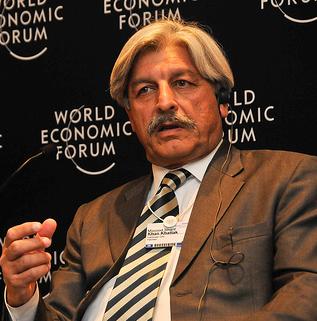Pakistan has been focused upon intensely for having an extremist political school of thought. Are there no Hindu extremists or Jewish extremists that could be bringing about a reactionary element amongst the Muslims of the world, including Pakistan? Is there not a need for the world to control religious extremism in all religions so that reactionary extremism does not occur in different religions?
Pakistan is an Islamic Republic that is progressive and forward-looking. That Pakistan can be called an extremist country beats common sense. While the United States still awaits the first lady president the people of Pakistan elected a lady, namely Shaheed Mohtarma Benazir Bhutto, as their prime minister not once but twice. How could this happen if the people of this Islamic country were fanatics by nature?
As long as the Kashmir issue and the situation in Afghanistan are not resolved to expect that Pakistan can climb down on its military and intelligence-gathering capabilities is also something very misplaced. Had Pakistan not possessed the military and intelligence-gathering potential the subcontinent would experience what we see in Gaza on a regular basis. The smaller countries of the region are fortunate that Pakistan has been a military balancing factor against India.
It is now time for the world to take the spotlight off Pakistan and give a little more attention to the extremist situation in India. The focus needs to be turned to India if the rising graph of the extreme political school of thought in South Asia is to recede.
In India, The Vishwa Hindu Parishad (VHP) came into being on Aug 29, 1964, where S S Apte, one of its founding fathers and the then secretary general of the RSS (Rashtrya Swayamsevak Sangh), declared that the world has been divided into being either Islamic, Christian or Communist and that all three of them viewed the Hindu society adversely. He also added that it had become necessary to organise the Hindu world (India) in order to save it from the evils of the Islamic, Christian and Communist world. The VHP believes that all Muslims and Christians in India were Hindus and so they must be encouraged to revert to Hinduism.
One of the stated goals of the VHP is to now make the global Hindu fraternity invincible through adherence to the Sanatan Dharma–i.e., Hinduism. Hindu nationalism is now a hard-line national ideology that looks at the modern-day so-called secular Republic of India as a Hindu polity–i.e., Hindu Rashtra.
The Sangh Parivar, posing as a charity organisation, provides organisational cover to all the violent and extremist Hindu organisations. BJP (Bharatya Janata Party), RSS, VHP and numerous other organisations are now a part of the Sangh Parivar. It is this organisation that collects funds within India and from abroad, including the USA and the UK, in the name of charity that is then diverted to violence against other religions.
The spate of communal violence in India against the minorities has been an outcome of this extremist Hindu nationalism ideology. In 1984, the Sikhs faced the onslaught after Operation Blue Star was launched and the most sacred Sikh shrine, the Golden Temple in Amritsar, was militarily attacked and destroyed. Sikhs were killed all over India at that time. The Babri Mosque episode, the more recent Gujarat massacre and many more atrocities against Indian Muslims are too well known. Over the years, the Christians have faced violence of sorts in India. Recently we witnessed incidents where churches were destroyed and Christians were burnt alive. The list of incidents can go into volumes.
In simple and plain words all I am saying is that if that peace in South Asia has to be achieved then the Hindu extremist political school of thought in India has to be reigned in fast. As long as Hindu extremism grows, the Kashmir issue is left unresolved and Afghanistan remains on the boil no one will be able to stem the growth of extremism in South Asia and it shall soon raise its head in all the South Asian countries where it currently exists in a latent state. The world, therefore, needs to awaken to what is happening on the religious extremist front in the world’s second most populous country–India. It is past the danger mark for everyone to begin working towards sanity and peace.
http://www.thenews.com.pk/editorial_detail.asp?id=161276

4 Replies to “Making peace in South Asia”